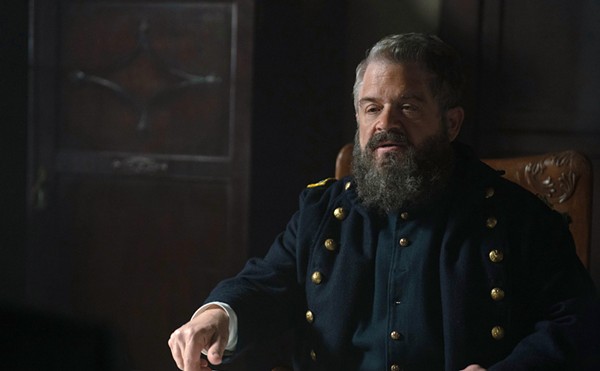"Cool live-action/animation blend lacks black-collar hanky panky"
Dir. Peter Care; writ. Chris Fuhrman (book), Jeff Stockwell (screenplay); feat. Kieran Culkin, Jena Malone, Emile Hirsch, Vincent D'Onofrio, Jodie Foster, Jake Richardson (R)
In the screen version of Altar Boys, newcomer Emile Hirsch plays Francis Doyle, the more sensitive half of a pair of mischief-prone best buds — fantasy-stoked rabble-rouser Tim Sullivan (Kieran Culkin) is the other — who basically live to goof off. The 14-year-olds experiment with pot, make noxious cocktails containing whatever booze they can siphon undetected from their parents' liquor cabinets, speculate about girls and sex, stage elaborate practical jokes, and draw comic books lampooning their rivalry with their perceived archenemy, geometry teacher and peg-legged priss Sister Assumpta (Foster). In lush, offbeat animated sequences illustrated by Spawn creator Todd McFarlane, she's depicted as a motorcycle-riding, habit-clad harridan called Nunzilla who torments the boys' superhero alter egos.
Since parents are scarce in Altar Boys, it's no wonder that Sister Assumpta provides a big honking authority figure for Tim and Francis to rebel against. To be fair, she does 86 Tim's copy of William Blake's Songs of Innocence and Songs of Experience after admonishing the verse-loving softie that Blake was a "dangerous thinker." Otherwise, it's unclear what the two have against Sister Assumpta — she's a sourpuss, sure, but a well-meaning one (a nice touch, considering their intense hatred of her). She's certainly more concerned with their welfare than is her ineffectual colleague, laid-back pastor and coach Father Casey (a wry D'Onofrio), who casually lights up a cigarette before dispensing vague advice to Francis about a moral quandary (which the cleric assumes, incorrectly, is sex-related) during a priest/altar boy heart-to-heart.
Sex does enter the picture, but not in a way you would expect, when burgeoning heartthrob Francis courts his cute, imaginative classmate Margie (Malone). The troubled lass harbors a shameful, Southern Gothic-style secret, the revelation of which doesn't add up to much, save for giving Altar Boys a slight melodramatic edge. Francis' escalating relationship with Margie creates a rift between him and the obsessive Tim, whose plans for revenge against Sister Assumpta become increasingly elaborate and bizarre. The scheme Tim ultimately cooks up — which involves feeding angel dust to a mountain lion housed in a local wildlife park, then transporting and releasing the crazed cat on school grounds — not only seems implausible but makes the characters seem impossibly boneheaded for attempting to carry it out. The plan has predictably tragic results, but the absurdity of the scheme undercuts the seriousness of its outcome.
The best thing The Dangerous Lives of Altar Boys has going for it is its live-action/animation blend. The transition between the two isn't exactly smooth, but it's a fun, novel way of shaking up — and commenting on — the strangely dour narrative. Mainly, the 'toons in Altar Boys underscore the one thing likely to stick with you after the movie ends: the notion that fantasy not only provides a momentary escape from our daily lives, but helps us come to grips with all the heartbreaks, setbacks, and perplexities adulthood offers. - Adel Marley
Mr. Deeds
"Mr. Deeds goes to ruin"
Dir. Steven Brill; writ. Tim Herlihy, based on 1936 screenplay by Robert Riskin and a story by Clarence Budington Kelland; feat. Adam Sandler, Winona Ryder, John Turturro, Steve Buscemi, Jared Harris, Peter Gallagher, Allen Covert, Conchata Ferrell (PG-13)
In the climax to Mr. Deeds, Longfellow Deeds (Sandler), virtuous antithesis to Gordon Gekko, addresses a meeting of predatory stockholders and convinces them of two things: Greed is no good and be true to your childhood ideals. Yet greed is the only explanation for why such talented actors as Winona Ryder, John Turturro, and Steve Buscemi signed on to this imbecilic project. (Publicity, rather than pay, probably induced the Rev. Al Sharpton to play himself, a sanctimonious clown). Steven Brill has vandalized Frank Capra's 1936 classic, Mr. Deeds Goes to Town, and the result is true to the childish ideas of current Hollywood accountants.
When a media magnate dies, his distant nephew, Deeds, inherits $40 billion. For the first time, Deeds leaves homely Mandrake Falls, New Hampshire (Vermont in the original), where he sells pizza and writes greeting-card verse. In New York City, righteous Deeds triumphs over corporate sharks and tabloid parasites. Wholesome rural values confront urban decadence, but the movie is muddled by a post-9/11 compulsion to depict New York as sacred Wonderland.
The high point of the witless humor is the concoction of pizza with peanut butter and Oreos; a low point comes when Deeds tosses seven cats from an apartment window. Effective satire requires knowledge, but, Mr. Deeds, oblivious to customs of country and city, exults in ignorance. Chicken parmigiana would not be on the menu of a chichi New York restaurant. Mr. Deeds should not be on the agenda of anyone who values subtlety, intelligence, and grace. - Steven G. Kellman















